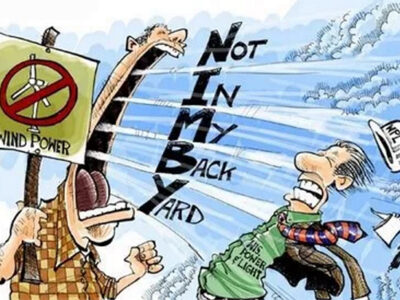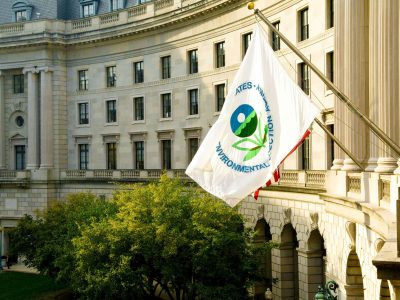Supply-Side Regulations & Clean Vehicles
As Congress votes to undermine California's sovereignty to set supply-side standards on polluting vehicles, CLEE's research shows why these policies are so effective
In May 2025, both the U.S. House and Senate passed resolutions to revoke California’s Clean Air Act waivers, which allow the state to enforce stricter vehicle emissions rules than federal standards (see Ann Carlson’s post on this issue). If signed by the President—and if successful in the face of court challenges to their dubious legality—these resolutions would nullify California’s authority to set stricter vehicle standards, potentially rolling back decad...
CONTINUE READINGA Critical Analysis of the Seven County Opinion
The court’s opinion ignores basic principles of law and statutory text in order to achieve a policy goal.
This is the second in a series of blog posts about the Court’s Seven County opinion. In our first post, we summarized the key points from the opinion. Here, we provide our assessment of the Court’s analysis. The Court’s analysis, especially in Part II.B, where it sets specific limits on the scope of NEPA, relies primarily on two steps. First, it begins with the proposition that the “proposed action” is the basis for NEPA review. Such a starting point...
CONTINUE READINGClimate Lawsuits Now a Matter of Life and Death
The Drain is a weekly roundup of environmental and climate news from Legal Planet.
What a week for watchers of climate litigation. Big new filings, claims of death and destruction, a landmark ruling, and a juicy hearing all in the span of 36 hours. First, there was what the New York Times described as “the first wrongful death lawsuit” to be brought against oil and gas companies over claims that they deceived the public about climate change and caused dangerous global warming — in this case related to the 2021 heat dome in the Pacific No...
CONTINUE READINGCould Zero-Emission Hydrogen Help Reduce Aviation Emissions in California?
State’s federally funded hydrogen hub releases aviation whitepaper co-led by CLEE.
Few industries face as complex a challenge in decarbonizing as aviation. While great for decarbonizing on-road transportation, batteries are generally too heavy to power long-distance flights. Low-carbon biofuels blended into fossil jet fuel represent only a partial solution, due to lack of feedstocks and blend limits. Zero-emission hydrogen could represent a solution, either as an ingredient for synthetic jet fuel that can drop in as a replacement for fossil jet fuel or...
CONTINUE READINGThe Outcome of the Seven Counties Case
Court emphasizes agency discretion and judicial deference in NEPA.
The Supreme Court issued its decision today in the Seven County NEPA case (available here). For background on the case, see our prior posts here, here, here, and here, as well as our article. In this post, we’ll provide a brief overview of the opinion. Next, we’ll undertake a brief analysis of the Court’s reasoning in our second post. After that, our final post will explore what we think the likely implications of the opinion are for NEPA compliance by feer...
CONTINUE READINGLeft NIMBYs Strike Out Yet Again
The Urban Institute study that they cite as evidence for stopping housing does not say what they claim.
The recent publication of Ezra Klein’s and Derek Thompson’s Abundance has the Alt-Left NIMBYs out in force. Again. Outraged by Klein and Thompson’s call for zoning reform, they argue that zoning reform has nothing to do with housing affordability. That’s their standard line. What isn’t standard is their reliance on a quality peer-reviewed study from the Urban Institute to back up their claims. Citation to this study as a way fighting housing has now appeared in...
CONTINUE READINGEnvironmental Rollbacks: Will the Trump Administration Overplay Its Hand?
The odds are good that Trump agencies will go too far out on a limb.
It’s no secret that Trump is likely to roll back as many environmental regulations as he possibly can, starting with the Biden Administration’s climate rules. In pursuit of that goal, he has pushed agencies to adopt high-risk legal arguments for rollbacks rather than more reliable strategies. But he may run into a serious roadblock, given that in May the Administration lost in 26 out of 27 district court rulings. Before May, Trump was losing about two-thirds ...
CONTINUE READINGGas Price Politics and Desperate Moderates
The Drain is a weekly roundup of environmental and climate news from Legal Planet.
In 18 years of working in newsrooms around Los Angeles, I talked with lots of political campaigns — but a phone call from Antonio Villaraigosa in spring of 2018 stands out. I was at my desk in the cramped newsroom of KCRW, sitting in between All Things Considered host Steve Chiotakis and producer Ben Gottlieb, who were prepping newscasts when Ben’s office phone rang. “Antonio Villaraigosa is ready for you,” the person on the phone said. “He’s sitting i...
CONTINUE READINGTrump Goes Nuclear
Four new executive orders try to launch a nuclear renaissance.
On Thursday, I posted a list of Trump’s energy and environmental executive orders. By Friday, it was obsolete. Four new Executive Orders shove safety and environmental concerns to the curb to make the American nuclear industry great again. (I’m surprised Trump didn’t say anything about Making Atoms Great Again.) There’s an argument for nuclear as a zero-carbon energy option, but Trump’s orders provide little assurance that the reactors will be safe. The Four E...
CONTINUE READINGWhat Happened to EPA Enforcement?
Enforcement efforts peaked long ago and have been in long-term decline. Trump will accelerate that.
According to a recent report by the Environmental Integrity Project, “During the first Trump Administration, EPA inspections, penalties, and the enforcement of environmental laws fell significantly, worsening a long-term decline in enforcement activity that began approximately twenty years ago. The numbers bear out this conclusion but raise three questions: What’s behind the long-term trend? Why has pollution generally continued to decline despite weaker enforcemen...
CONTINUE READING









